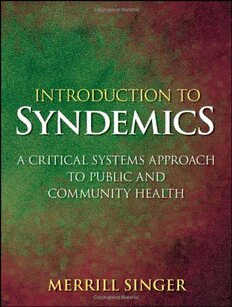
Introduction to Syndemics: A Critical Systems Approach to Public and Community Health PDF
301 Pages·2009·15.736 MB·English
Most books are stored in the elastic cloud where traffic is expensive. For this reason, we have a limit on daily download.
Preview Introduction to Syndemics: A Critical Systems Approach to Public and Community Health
Description:
This book explains the growing field of syndemic theory and research, a framework for the analysis and prevention of disease interactions that addresses underlying social and environmental causes. This perspective complements single-issue prevention strategies, which can be effective for discrete problems, but often are mismatched to the goal of protecting the public's health in its widest sense."Merrill Singer has astutely described why health problems should not be seen in isolation, but rather in the context of other diseases and the social and economic inequities that fuel them. An important read for public health and social scientists."—Michael H. Merson, director, Duke Global Health Institute"Not only does this book provide a persuasive theoretical biosocial model of syndemics, but it also illustrates the model with a wide variety of fascinating historical and contemporary examples."—Peter J. Brown, professor of Anthropology and Global Health and director, Center for Health, Culture, and Society, Emory University"The concept of syndemics is Singer's most important contribution to critical medical anthropology as it interfaces with an ecosocial approach to epidemiology."—Mark Nichter, Regents Professor, Department of Anthropology, University of Arizona"Merrill Singer offers the public the most comprehensive work ever written on this key area of research and policy making."—Francisco I. Bastos, chairman of the graduate studies on epidemiology, Fundacao Oswaldo Cruz"Exquisitely describes how this new approach is a critical tool that brings together veterinary, medical, and social sciences to solve emerging infectious and non-infectious diseases of today's world."—Bonnie Buntain, MS, DVM, diplomate, American College of Veterinary Preventive Medicine"For too long the great integrative perspectives on modern biomedicine and public health disease ecology and social medicine-have remained more or less separate. In this innovative and provocative book, Merrill Singer develops a valuable synthesis that will reshape the way we think about health and disease."—Warwick H. Anderson, MD, PhD, professorial research fellow, Department of History and Centre for Values, Ethics, and the Law in Medicine, University of Sidney
See more
The list of books you might like
Most books are stored in the elastic cloud where traffic is expensive. For this reason, we have a limit on daily download.
